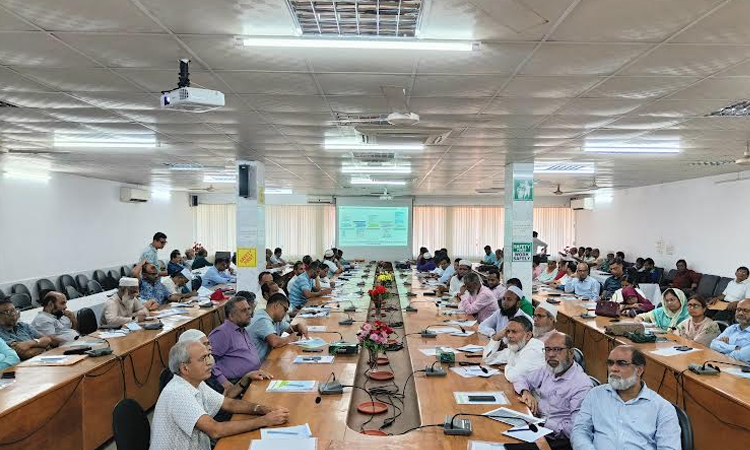News Flash
News Flash

BAU (Mymensingh), September 30, 2025 (BSS) - A workshop titled "Food Fortification in Bangladesh" was held today at Bangladesh Agricultural University (BAU), focusing on strategies to combat malnutrition and produce nutrient-enriched foods.
The event took place at 11:00am in the Faculty of Agriculture Conference Room and was jointly organized by the Professor Muhammad Hossain Central Laboratory (PMHCL) of BAU and the Global Alliance for Improved Nutrition (GAIN).
Presenting the keynote paper, Dr. Mohammad Gulzarul Aziz highlighted the alarming state of nutrition among women and children in Bangladesh. "Deficiencies in essential nutrients such as vitamins, iron, zinc, and iodine remain widespread. Over 22% of children and women suffer from vitamin D deficiency, 44% of women from zinc deficiency, and 42% from iodine deficiency," he said. "Food fortification beyond salt-such as in rice and edible oil-is now urgently needed."
Dr. Aziz explained that food fortification involves adding one or more vitamins or minerals to food in precise quantities. He noted that initiatives are underway to fortify rice with six key nutrients: Vitamin A, B1, B12, folic acid, iodine, iron, and zinc. Fortifying edible oil with Vitamin D was also emphasized as a strategy to curb Vitamin D deficiency.
Comparing regional progress, he said several Asian countries have already implemented mandatory food fortification programs. While salt iodization is practiced in Bangladesh, efforts to fortify wheat flour or other staples are yet to begin.
The workshop was presided over by PMHCL Director Prof. Dr. Md. Amir Hossain. BAU Vice-Chancellor Prof. Dr. A. K. Fazlul Haque Bhuiyan attended as the chief guest, while BINA Director General Dr. Shariful Haque Bhuiyan was present as the special guest. More than 150 teachers and researchers from various faculties of the university took part.
Dr. Ashek Mahfuz, Portfolio Lead for Large-Scale Food Fortification and Value Chain at GAIN, presented a paper on "Large-Scale Food Fortification in Bangladesh." He pointed out that Bangladesh lacks a centralized hub for food fortification research.
"Our current focus is on biofortification rather than industrial fortification. Alongside encouraging farmers to grow biofortified rice, we are also working to enrich pulses with zinc and iron," he said.
While acknowledging the long-standing practice of adding Vitamin A to edible oil and iodine to salt, Dr. Mahfuz stressed the need for research to determine how much of these nutrients consumers actually absorb.
BAU Vice-Chancellor Prof. Dr. A. K. Fazlul Haque Bhuiyan praised the initiative and emphasized the importance of public awareness.
"Many are suffering from chronic diseases like diabetes and cancer due to poor nutrition. Raising awareness is vital, and I am committed to supporting this initiative in every possible way," he said.
He also called for coordinated efforts in research.
"Instead of 30 fragmented projects, if three integrated projects are undertaken on the same issue, results will come faster. Teachers and students at all levels can help spread the message of food fortification to the grassroots. But for lasting impact, government intervention is now essential," he added.